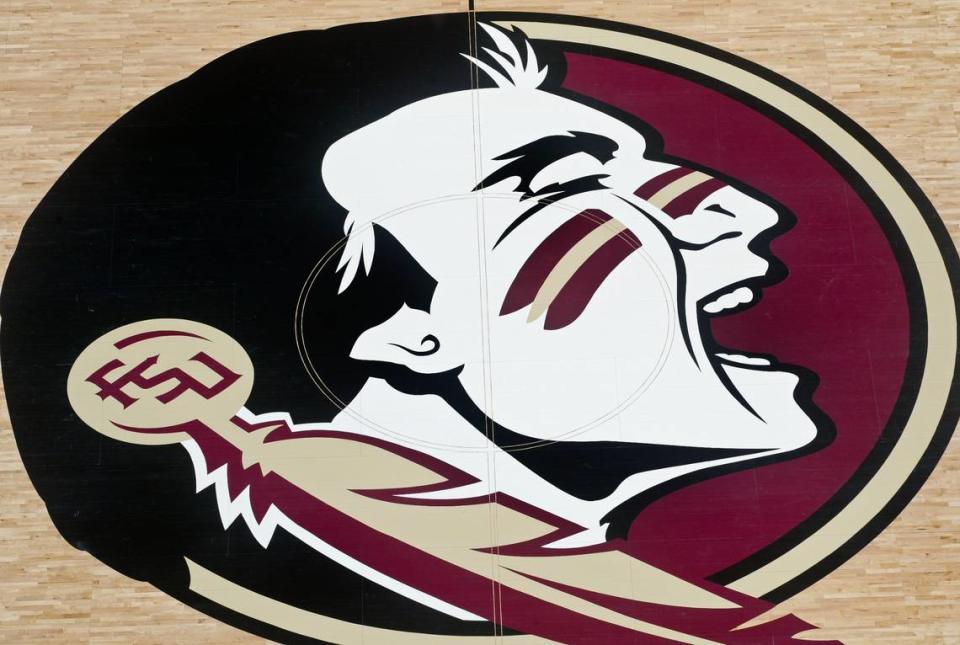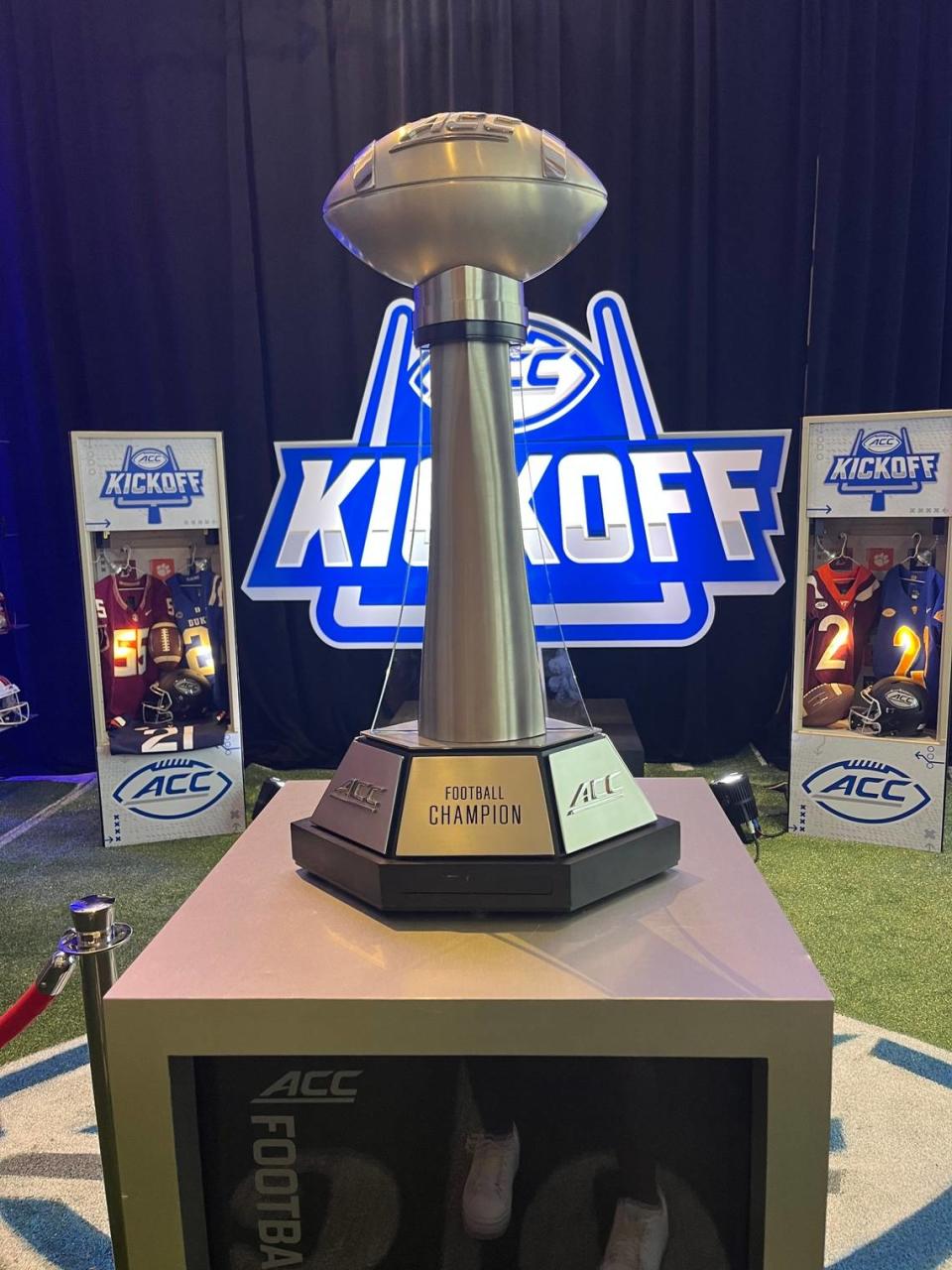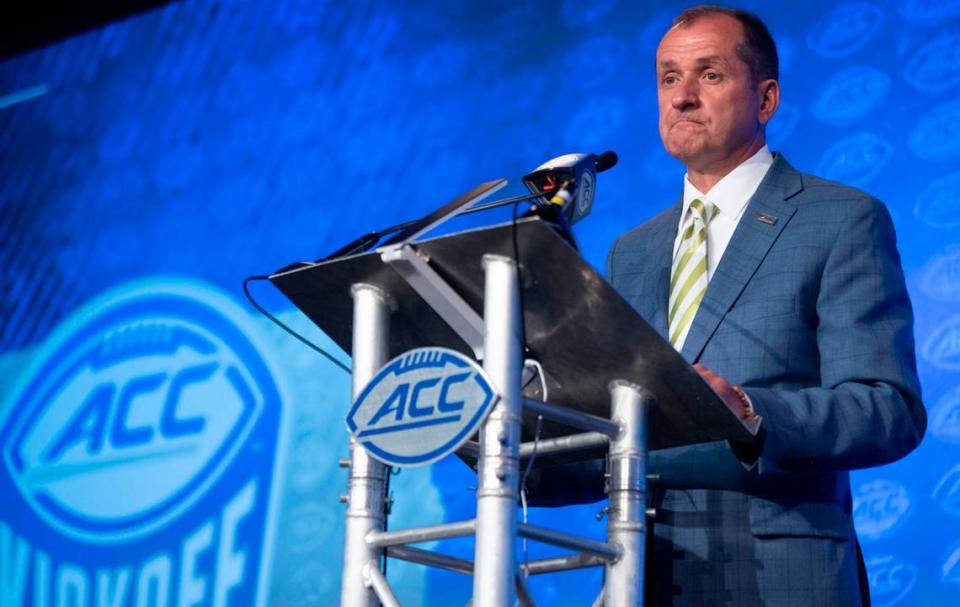As ACC-Florida State lawsuits drag on, where do things stand in NC, Florida courts?
One-hundred and thirty-two days, as of Thursday, have passed since the formal beginning of the legal case that will decide the ACC’s future. Or is it 133 days? To give you an idea of how things are going between Florida State and the ACC, they can’t even agree on when their court fight officially began, or which case is the case — the one that ultimately should settle their dispute.
Oh, they know the dates. Florida State last Dec. 22 sued the ACC in Leon County, Florida, in a legal offensive to attempt to maneuver its way out of the conference’s Grant of Rights agreement. But unbeknownst to FSU at the time, the ACC actually sued the university the day before in Mecklenburg County, in a defensive move to uphold the Grant of Rights.
Given that both FSU and the ACC have accused one another of filing first in an effort to establish jurisdiction, the great date debate carries significance. The conference believes its case should take precedence while the one in Florida should be stayed. FSU, meanwhile, believes its case should take precedence while the one in North Carolina should be stayed.
FSU already lost that argument in North Carolina, but is appealing to the state Supreme Court. The ACC hasn’t yet lost its fight to stay FSU’s case in Florida, but likely will.
And so both cases continue to operate on parallel lines in courtrooms about 400 miles apart. More than four months into these dueling lawsuits, it’s still unclear which one actually takes legal precedence. Is it the one Florida State filed in its home county? The one the ACC filed the day before, in its home county?
Is it neither, which would mean, really, that it’s both? Yes? No? Maybe?

And oh, by the way: Clemson is now also suing the ACC over the Grant of Rights, with similar-but-different arguments about why it shouldn’t be legally enforceable. The ACC is counter-suing Clemson. And not to be outdone: the Florida Attorney General, Ashley Moody, is also suing the conference and attempting to force the release of its television rights contract with ESPN, which Moody argues should be a public record under Florida law.
So that’s five lawsuits, if you’re keeping score, involving the ACC — all of which, to varying degrees, will determine the conference’s long-term viability. (And one of which could determine whether college athletics leagues are allowed to keep secret media rights agreements, which conferences have often protected over the years as if they’re some kind of sacred yet secret holy grails.)
A couple things, at least, have become clear over the past four months: One, we’re likely a long — long — way from any kind of final resolution that will provide clarity about the Grant of Rights and its legal enforceability. And, two, while it’s impossible to predict how this might end, clear winners have already emerged: the lawyers. There is no end in sight to the billable hours.
Just about every week now, there’s another slow-drip development in the proceedings. Last week, Moody, the Florida attorney general, announced her lawsuit against the conference. Meanwhile this week, on Thursday, there was another hearing in Mecklenburg County — a “status report” related to FSU’s appeal of its earlier defeat there. Already, these cases have produced reams of documents — complaints, amended complaints, orders and on and on. It can be a lot to try to follow.
And so consider this a primer, of sorts — a what-you-need-to-know, in Q-and-A form, about the legal efforts to preserve the ACC. Or, in the case of Florida State and Clemson, to destroy it.
Q. More than four months into the FSU-ACC dispute, where do things stand?
A. How much time do you have?
The short answer is this: Both of these cases — the one the ACC filed in North Carolina and the one FSU filed in Florida — appear to be progressing as one might expect, though it’s still very early. The ACC has already received a favorable ruling in North Carolina Business Court, where Judge Louis A. Bledsoe denied FSU’s motion to dismiss that case or have it stayed.
The ACC filed the same motions in Leon County in effort to have FSU’s case dismissed or stayed there. While there hasn’t been a final ruling there it’d be stunning, based on a couple of early (and long and meandering) hearings, if Judge John Cooper sided with the ACC. To condense three hearings (and counting) and one 76-page order into a sentence, both FSU and the ACC are working hard to gain the home court advantage.
Neither of these cases have even progressed all that much into arguing about, well, the actual arguments. So far, it’s all about trying to establish jurisdiction and venue.

Q. Is that because both sides believe a “home court” would produce a more favorable ruling?
A. Sort of, but not necessarily for the reason you might think.
Look, we’re not going to pretend that doesn’t matter to some degree. Would a Leon County judge look more favorably upon FSU’s case? Would a Mecklenburg County judge do the same for the ACC? It’s possible, though any judge would likely reject the implication of such bias, however small and immeasurable it might be.
And so both sides wanting this settled in their home states isn’t so much about a conspiracy-driven notion of receiving preferential treatment from a friendly judge. It’s more about the importance of establishing their case as the case — the one that should take precedence.
It may be strange to think of it this way, but the ACC’s case against FSU is similar to FSU’s case against the ACC. Both sides are alleging that they’re the victim. Both sides are arguing that the other has acted in a detrimental and damaging way. Both sides are arguing that these cases will go a long way toward determining their viability and survival.
And so it’s important for both to establish why their case is the one that matters the most, while arguing why the other should be dismissed or stayed. Which is exactly what they’ve been doing.
Q. Indeed — though hasn’t FSU already lost that argument in North Carolina?
A. It has, for now, though FSU is appealing.
Q. Still, that seems like a significant win for the ACC, right?
A. It was, and Bledsoe, the North Carolina Business Court judge, was emphatic in his 76-page order that this case should be decided in North Carolina. In rejecting FSU’s motion to dismiss the ACC’s case or have it stayed, Bledsoe wrote that FSU’s argument hinged on the “erroneous view that it is the only ‘natural’ plaintiff in this dispute.”
“The ‘natural’ or ‘real’ plaintiff in a civil suit is the party that has allegedly suffered damages at the hands of its opponent,” Bledsoe wrote. “Here, that is the ACC, which alleges that the FSU Board (of Trustees) intended to breach the covenants not to sue in the Grant of Rights Agreements.”
Bledsoe also rejected FSU’s argument that the ACC had engaged in “procedural fencing,” and had filed first solely in an attempt to gain an advantage by having the case play out in North Carolina. To the contrary, Bledsoe wrote, “the nature of the case and the applicable law strongly favor allowing this matter to proceed in North Carolina.”

Q. OK, well what if the judge in Leon County decides the same thing — that FSU’s case in Florida should also proceed?
A. Well there’s the million dollar question. Or the $700 million question, perhaps, which is what FSU’s lawyers say would be the approximate cost of leaving the ACC if FSU can’t escape the Grant of Rights.
There’s a better than decent chance that neither of these cases is dismissed or stayed. FSU already lost in its attempt to dismiss or stay the ACC’s case in North Carolina. The ACC hasn’t yet suffered the same defeat in Leon County, but likely will.
And so it’s not difficult to see a scenario in which both of these cases play out simultaneously, and end in contrasting rulings — ACC with a “victory” in North Carolina; FSU with the same in Florida.
Q. And then what?
A. Nobody knows. No, really. Nobody knows.
If the ACC’s Grant of Rights is upheld in North Carolina while being struck down in Florida, it’s anybody’s guess how that would play out. Would the case go to the Supreme Court? Would there be some sort of settlement? A truce at midfield of Doak Campbell Stadium, or in front of ACC headquarters in Charlotte?
You can envision both sides coming together in peace after a hard-fought legal fight:
“Good job, all — great arguments all around.”
“Yes. We gave it our best but sometimes a tie is a tie.”
“Indeed, now let’s work together again. Go ACC.”
Well, OK — we can safely say that won’t be happening. But what would, in the event that these cases play out at the same time and end with contrasting results? It’s impossible to say.
Q. But still. Is there any indication at all of who might “win” in such a scenario? Or at least which side might have the advantage?
A. In a technical sense, it’d be the case that finishes first. That’s part of the reason for some of the legal jockeying we’re seeing already. It’s to the benefit of both parties to drag things out on the road, so to speak, while aiming to keep everything on track at home. Meaning: FSU wouldn’t mind prolonging matters in North Carolina, and same for the ACC in Florida.
Already, the ACC’s legal team is concerned about that very tactic in regards to the North Carolina case. In appealing Bledsoe’s ruling to the state Supreme Court, FSU has bought some time. Meanwhile, it has to be hoping that its case in Florida can progress toward an outcome that’d be favorable to FSU — though that’s a long way from happening.
In a court filing, James Cooney, the ACC’s lead attorney in the North Carolina case, wrote that FSU “has no right to manipulate proceedings between Florida and North Carolina so that it may advance its claims in Florida while delaying the ACC’s claims in North Carolina. FSU sought and was denied a stay of these proceedings. Permitting it to effectively gain a stay here (and in the process advance its claims in its preferred jurisdiction) significantly prejudices the ACC.”

Q. You know, why can’t FSU and the ACC just get in a room and hash all this out?
A. That’s certainly what a lot of people believe will ultimately happen — that there will be a settlement. And there may well be. Cooper, the Leon County judge, has already ordered both sides into mediation, though that’s more of a formality than anything. There’s no guarantee the sides will reach any kind of agreement and it seems unlikely at this point they would.
But could they, in time? It’s possible.
For it to happen, the ACC would likely have to believe that it would ultimately lose and that the Grant of Rights would be struck down in some way. But we’re a long way from that. The ACC is in a strong position in the North Carolina case and at worst at the moment seems headed toward the kind of legal “tie” that was described above.
It’s important to remember there’s no incentive for the ACC to settle — at least not at any amount that would be favorable toward FSU. The league is very much fighting for its long term survival and status as a so-called “power conference.” FSU has claimed the cost of buying its way out of the Grant of Rights to be between $570 and almost $700 million — a number that would likely be more than what FSU has received from the ACC over the duration of its membership.
If FSU wants to pay that, the ACC would undoubtedly listen. But why, at this point, would the league settle for anything less? The league’s football television value — which is what is driving all of this — would be weakened with FSU’s departure. An agreeable settlement would open the door for Clemson to follow the same path. And for other league members to do the same, after that.
The ACC’s best bet for long term viability is to fight FSU as long as it can, as hard as it can.
Q. We’ll save the Clemson questions for another day. But what about the Florida attorney general’s lawsuit against the ACC?
A. It’s interesting, and likely a part of some political posturing for Moody. It has to play well in Florida to sue the ACC and so publicly back FSU.
Beyond that, Florida is known for having some of the best (for the sake of transparency, at least) public records laws in the country. And the gist of Moody’s lawsuit is basically this: the ACC’s contract with ESPN, to which every ACC school agreed, should be public. In a statement announcing the lawsuit, Moody said this:
“The ACC is asking a state entity — Florida State University — to potentially pay and lose more than a half a billion dollars but is refusing to produce the documents related to that outrageous price tag. We sent a public records request to the ACC in January, but they failed to fully comply. We are taking legal action against the ACC for wrongfully withholding these important public records.”
The release of the ACC’s contract with ESPN would be great news for the public, and especially for journalists and others who long to get an inside look at how these contracts work. It’d be not-so-good news for ESPN and the ACC, both of which have described the contract as a trade secret that warrants legal protection.
Moody’s lawsuit also raises the question of a precedent-setting moment: if the ACC’s contract with ESPN is a public record, then so, too, are the SEC’s and Big 12’s television contracts, given both of those leagues are home to public universities in Florida (the University of Florida, in the case of the SEC, and UCF, in the Big 12).
Remember, too, that like the University of Florida, both FSU and UCF in recent years have taken steps to shield athletic department business from public records laws. And so there’s some irony here: some records, FSU would love to be public. Others, not so much.
Q. And so when might there be some real resolution with all this?
A. What makes you think there ever will be?
That’s a joke. Kind of. But expect these cases to drag on. More than four months have passed, and we’re not even all that close to a clear determination of where the ACC/FSU case will be settled, let alone when it might be. The only thing we really know, again: the lawyers are getting paid.
NC Reality Check is an N&O series holding those in power accountable and shining a light on public issues that affect the Triangle or North Carolina. Have a suggestion for a future story? Email realitycheck@newsobserver.com

 Yahoo Sports
Yahoo Sports 
